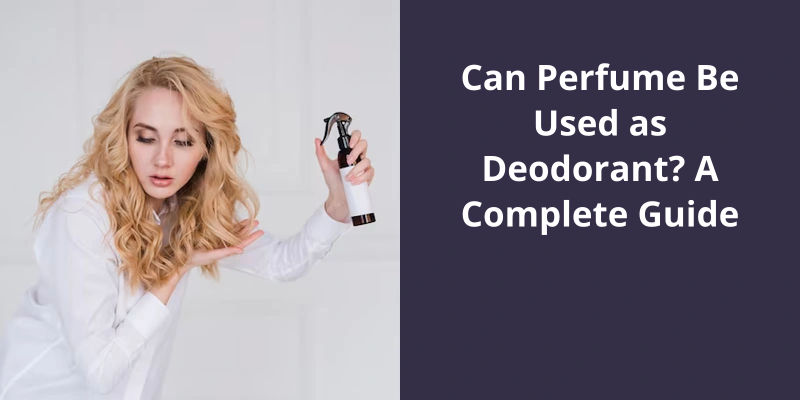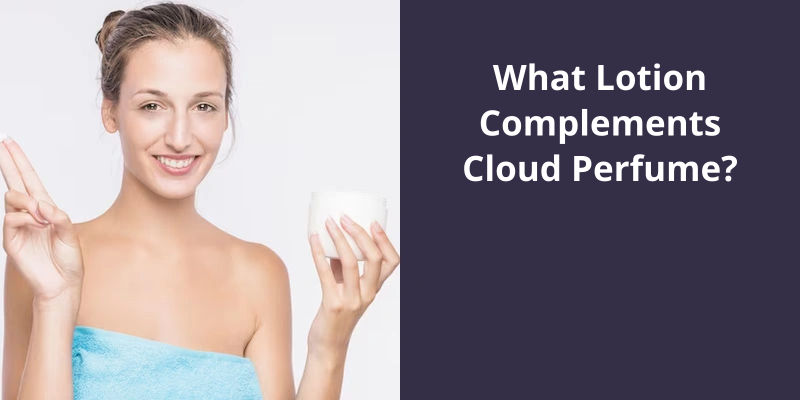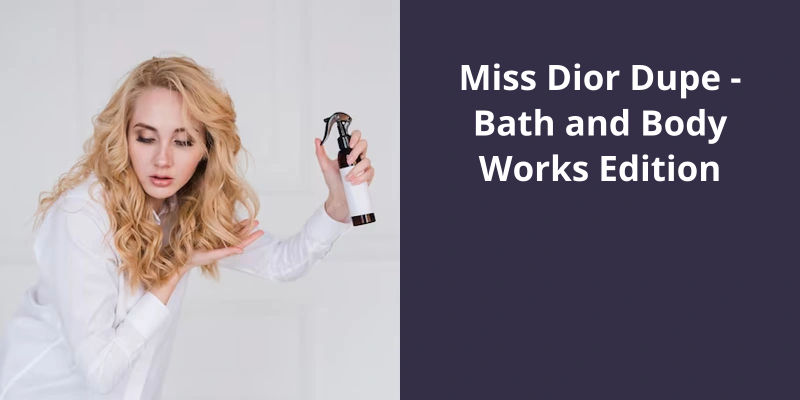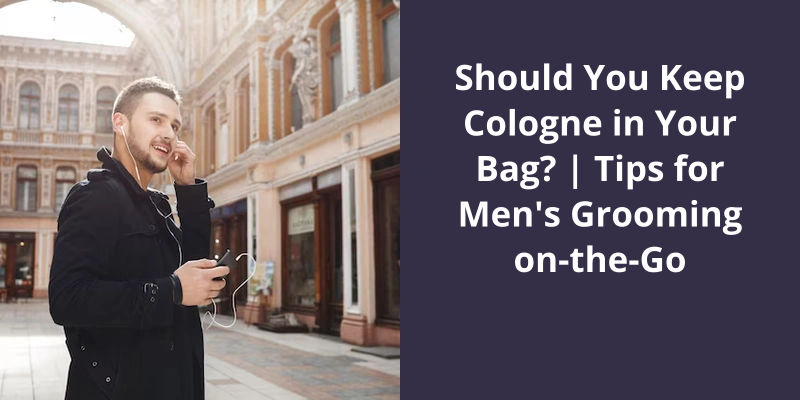Perfume can indeed be used as a deodorant, but it is not typically as effective. Deodorants are specifically designed to control the bacteria that cause strong body odor when we sweat. They often contain ingredients that either neutralize or mask the smell. In contrast, perfumes are mainly used to give a pleasant scent. Using perfume as a deodorant may only cover up body odor temporarily and, without the bacteria-controlling properties of a deodorant, that body odor may return as the day goes on. Plus, perfumes may cause irritation when applied to sensitive areas, such as the underarms. Therefore, it’s generally more effective to use a product specifically designed as a deodorant to control body odor. However, pairing a deodorant with a perfume or scented body spray can help you smell great all day.

Can I Use Perfume Instead of Deodorant?
Perfume and deodorant are two distinctly different things, yet people often confuse the two. Many may believe that applying perfume on their underarms will work as a substitute for a deodorant. However, the truth is that perfume alone can’t provide the benefits that deodorant offers.
Deodorants come in different forms like sprays, sticks, and roll-ons. Each of these formulations has specific properties that help them perform their function effectively. They contain antibacterial agents, and some have added fragrances to mask any bad odors.
Fragrances used in deodorants and perfumes differ in concentration levels of essential oils or fragrance oils that make up the scent. The high fragrance content in the perfume may cause skin irritation or allergic reactions when applied to areas like the underarms.
In temperatures that are too hot or too cold, deodorants protect the skin and keep the sweat glands under control. In addition, the smell of the perfume may mix with the bodys natural smell and make the odor unbearable.
Perfumes don’t have any of the active agents like aluminum or zinc found in deodorants that prevent body odor. The best way to maintain good personal hygiene is by bathing frequently and using deodorants.
The Cultural Significance and History of Using Perfumes and Deodorants
- Perfumes and deodorants have been used for thousands of years by different cultures around the world.
- In ancient Egypt, perfume was considered a luxury item and was used for religious rituals and to mask unpleasant odors.
- The Greeks and Romans also used perfume for religious and social occasions, as well as for medicinal purposes.
- During the Middle Ages, perfumes were used primarily by the wealthy and by royalty.
- In the 19th century, the development of synthetic fragrances led to the mass production and commercialization of perfume.
- Deodorants weren’t widely used until the early 20th century, when the first commercial deodorant was introduced.
- Today, perfume and deodorant are popular personal care products used by people of all ages and social backgrounds.
- Perfumes and deodorants are often used to express personal style and to enhance one’s overall appearance and confidence.
- The cultural significance of perfume and deodorant varies across different societies and can be influenced by factors such as religion, gender, and social status.
While some may argue that fragrance is an important component of deodorant, the truth is that it isn’t necessary for it to work effectively. In fact, there are ingredients in many deodorants that work to eliminate body odor by targeting the bacteria that causes it. So, the question remains: should deodorant have fragrance? Let’s dive deeper into the topic to find out.
Should Deodorant Have Fragrance?
However, fragrance is still a popular addition to deodorant. It can provide a fresh scent and improve overall user experience. Additionally, some people may prefer scented deodorant as a way to complement their personal hygiene routine or as a way to enhance their personal style.
Natural Alternatives to Synthetic Fragrance in Deodorants
- Essential oils
- Herbs and spices
- Baking soda
- Cornstarch
- Vinegar
- Coconut oil
- Shea butter
Source: Can we use both deodorants and perfumes together? – Quora…
Now that we’ve established the benefits of using deodorants and body sprays, the question arises as to whether it’s okay to use them together. While the two products aim to provide a similar result, there are specific differences that could affect the overall effectiveness of their combination. Therefore, in this next section, we will explore the reasons why you may or may not want to use body spray and deodorant together.
Can You Use Body Spray and Deodorant Together?
When it comes to personal hygiene, using deodorant and body spray together is a popular choice for many people. However, some individuals wonder if it’s safe to use these two products simultaneously.
Both products serve different purposes, and combining them can provide an excellent result that lasts for a more extended period.
Maintaining good personal hygiene, such as showering regularly, wearing clean clothes, and choosing breathable fabrics, can help improve your overall odour even before you consider using deodorants or body sprays.
Another key point to consider is that excessive use of body spray and deodorant can be overpowering to your senses and those around you. Using them in moderation or following the recommended dosage is crucial to avoid overwhelming yourself with the fragrance or causing discomfort to others.
If you’ve sensitive skin or prone to allergies, it’s recommended to choose products that have minimal or no perfume. Always read the label and check for any warning or precautionary statements before using the product to avoid any adverse reactions.
However, moderation is essential to avoid overpowering your senses and those around you.
Unscented deodorant has become a popular option among consumers for various reasons. While some people may experience symptoms from fragrance, others prefer to let the scent of other body care products stand out. Moreover, those who spend time outdoors and want to go scent-free can benefit from unscented deodorant. The best part is that it still provides the same odor-fighting protection as scented deodorants. Let’s take a closer look at why unscented deodorant may be the better choice for you.
Is It Better to Have Unscented Deodorant?
Unscented deodorant, as the name suggests, lacks any artificial fragrance or odor masking agents. This means that you’re free from exposure to any potentially harmful chemicals that may cause skin irritation, allergies, or other health issues.
The scent of artificial fragrances can actually attract mosquitoes, flies or other pests, which can be not only annoying but also harmful.
This is especially important if you work with or around people who may have allergic reactions to certain scents.
Rather than masking or altering your natural body odor, it allows you to be true to your authentic self. You can still enjoy the benefits of an effective antiperspirant without any of the added chemicals or fragrances.
The Potential Health Effects of Using Scented Deodorant.
Using scented deodorants could have an impact on one’s health. However, the effects could vary depending on the user’s body, fragrance contained, and the frequency of usage. Some people may experience skin irritation or allergic reaction while others may not. Further research is necessary to conclude any conclusive impacts of scented deodorant on health.
It’s important to be thoughtful when selecting personal care products to avoid clashing scents. While cologne is a popular addition to one’s daily routine, pairing it with strong-scented hygiene products like deodorants and body washes can create an overwhelming olfactory experience. Let’s explore why deodorants and cologne may clash and how to avoid this issue.
Do Deodorants Clash With Cologne?
When it comes to grooming and personal hygiene, there are a lot of factors to consider, not the least of which is fragrance. One such question is whether deodorants clash with cologne. The answer to this question depends on a number of factors, including the specific fragrances you’re using and how you apply them.
In general, it isn’t recommended to use strongly scented deodorants or body washes in combination with cologne. This is because the strong scents of these products can overwhelm the subtle notes of your cologne, creating a cacophony of clashing fragrances.
This will help to minimize any clash between the different fragrances, allowing each individual scent to shine through. Additionally, it’s a good idea to apply your cologne after your deodorant, as this will help to ensure that the fragrance isn’t masked by any residual scent from your hygiene products.
When it comes to selecting a fragrance for yourself, it’s important to consider both the specific product you’re using and the occasion for which you’ll be wearing it. For example, a light, citrusy cologne may be perfect for a summer picnic, but may not be appropriate for a formal evening event. Similarly, a musky, woody scent may be appropriate for a night out with friends, but may be too heavy for everyday use.
Ultimately, the key to finding the perfect fragrance is to experiment and explore. Try out different products and scent combinations, and pay attention to the way your body chemistry interacts with the various fragrances. With a little bit of care and attention, you can find the perfect combination of deodorant, body wash, and cologne to help you feel confident and stylish, no matter the occasion.
Watch this video on YouTube:
When it comes to scent, perfume isn’t the only option out there. In fact, there are many alternatives available that can help you smell amazing without the use of traditional fragrances. From body lotions to shower gels, there are plenty of enticing options to explore. Read on to discover our top picks for fragrance alternatives that are just as effective as your go-to perfume.
What Can I Use Instead of Perfume?
Perfume can often be too strong for some individuals or there may be certain circumstances where it’s not appropriate to wear. Fear not, as there are plenty of alternatives that can leave you smelling just as lovely.
Body lotions are a great alternative to perfume, as they not only provide moisture to the skin but often leave a subtle scent. One popular option is the Editions de Parfums by Frederic Malle Carnal Flower Body Butter, which is infused with citrus and woody notes for a luxurious indulgence.
Body sprays are another option, offering a lighter fragrance than perfume. They can be sprayed all over the body and even on clothing for a long-lasting scent. There are many scents to choose from to match your mood and preference.
Shower gels are also a great option, as they not only cleanse the skin but leave a subtle fragrance. Plus, they can be a part of your daily shower routine, making it easy to incorporate into your daily routine.
Hair mists have gained popularity in recent years as a way to add a subtle scent to the hair, and can often double as a detangler or leave-in conditioner. They come in many scent options and are a great way to add a touch of fragrance without overpowering the senses.
Finally, deodorants can also provide a subtle scent without being as overpowering as perfume. Plus, they help fight body odor throughout the day. There are many options to choose from, including natural and aluminum-free alternatives.
Scented Body Powders: Scented Body Powders Can Provide a Light Fragrance and Can Also Be Used to Absorb Excess Moisture and Reduce Body Odor. They Come in Many Scents, From Floral and Fruity to Musky and Woody.
- Scented body powders can provide a pleasant fragrance
- They can also absorb excess moisture
- Reduces body odor
- Available in a variety of scents
- Floral scents, fruity scents, musky scents, and woody scents
Conclusion
However, it’s important to note that perfumes don’t provide the same level of antiperspirant protection as deodorants, particularly during physical activity. On the other hand, if you want a scent that lingers throughout the day, perfume could be a viable alternative. Ultimately, it’s up to you to decide which product best suits your needs and lifestyle.





